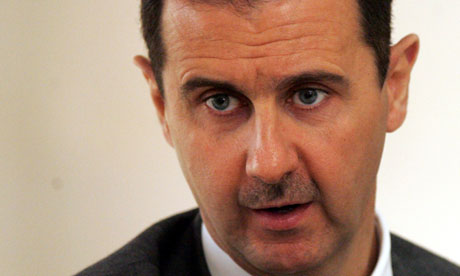Middle East will be unstable for decades if rebels take Syria, says Assad
![]()
Syrian leader warns of domino effect and accuses Arab neighbours of sheltering rebels who seek to overthrow himStaff and agencies
guardian.co.uk

Bashar al-Assad has called Turkey’s leaders ‘foolish and immature’ for helping Syrian rebels who seek his removal from power. Photograph: Sasha Mordovets/Getty Images
The Syrian president, Bashar al-Assad, has warned that the Middle East faces being destabilised for decades if rebel forces battling to overthrow him succeed.
Assad, locked in a two-year conflict he says has been fuelled by his regional enemies, also criticised Turkey’s “foolish and immature” leaders and accused Arab neighbours of arming and sheltering rebel fighters.
“If the unrest in Syria leads to the partitioning of the country, or if the terrorist forces take control … the situation will inevitably spill over into neighbouring countries and create a domino effect throughout the Middle East and beyond,” he said in an interview with Turkish television.
Turmoil would spread “east, west, north and south. This will lead to a state of instability for years and maybe decades to come,” Assad said in the interview, posted by the Syrian presidency on the internet.
The UN says at least 70,000 people have been killed in Syrian’s conflict. Daily death tolls of around 200 are not uncommon, monitoring groups say. More than a million refugees have fled the country and the Syrian Red Crescent says nearly four million have been internally displaced.
Neighbouring Lebanon and Jordan are both struggling to cope with the flood of refugees, while the sectarian element of the conflict – with mainly Sunni Muslim and Islamist fighters battling a president from Syria’s Alawite minority – has also raised tensions in neighbours such as Lebanon and Iraq.
While accusing opponents of using “sectarian slogans”, Assad said the essence of the battle was between “forces and states seeking to take their people back into historic times, and states wanting to take their peoples into a prosperous future”.
He appeared to be referring to Sunni Muslim Gulf states Saudi Arabia and Qatar, which have supported efforts to arm insurgents in an uprising which began with peaceful protests for reform and spiralled into civil war.
Assad said Turkey’s prime minister, Tayyip Erdogan, was recruiting fighters with Qatari money to wage war in Syria, but warned his former friend that the bloodshed could not easily be contained. “The fire in Syria will burn Turkey. Unfortunately he does not see this reality,” Assad said. Erdogan, he said, “has not uttered a single truthful word since the crisis in Syria began”.
Assad also condemned the Arab League, which has suspended Syria’s membership and last month invited opposition leaders Moaz Alkhatib and Ghassan Hitto to attend a summit meeting in his place.
“The Arab League itself lacks legitimacy,” he said. “It is an organisation which represents Arab states and not Arab people. It has lacked legitimacy for a long time because these Arab states themselves … do not reflect the will of the Arab people.”
Assad also dismissed Western countries that have condemned his suppression of protest as hypocrites. “France and Britain committed massacres in Libya with the support and cover of the United States. The Turkish government is knee-deep in Syrian blood. Are these states really concerned about Syrian blood?” Responding to rumours of his assassination spread by activists and fighters over the last two weeks, Assad said he was living as ever in Damascus, despite rebel advances in the outskirts of the city and regular mortar attacks on its centre.
“I am not hiding in a bunker. These rumours (aim) to undermine the morale of the Syrian people. I neither live on a Russian warship nor in Iran. I live in Syria, in the same place I always did.”
On Saturday troops loyal to Assad fought rebels in a town outside Damascus, according to opposition. In the north, warplanes hit rebel-held areas of Aleppo, Syria’s largest city, killing fifteen people.
The Britain-based Syrian Observatory for Human Rights says Saturday’s fighting was concentrated around the town of al-Otaybah, east of Damascus. The south-eastern Damascus suburb of Jaramana was hit by several mortar rounds, the group said. It sources its reports of daily fighting to a network of activists on the ground.
Related Articles
What Future for Gaelic Arts ?
![]()
The Scottish blog Bella Caledonia reports that Pròiseact nan Ealain / The National Gaelic Arts Agency has announced they are winding up due to the withdrawal of funding from Bòrd na Gàidhlig
Washington organiza red estudiantil contra Venezuela, Cuba e Irán
![]()
Estudiante venezolano realiza gira en EEUU para coordinar acciones contra el gobierno de Hugo ChávezDurante el último año, distintas agencias
Italy president starts consultations on new government
![]()
REUTERS, ROME People display posters outside Quirinale Presidential Palace, the one at left reading in Italian ‘Nov. 12th, national holiday’,



